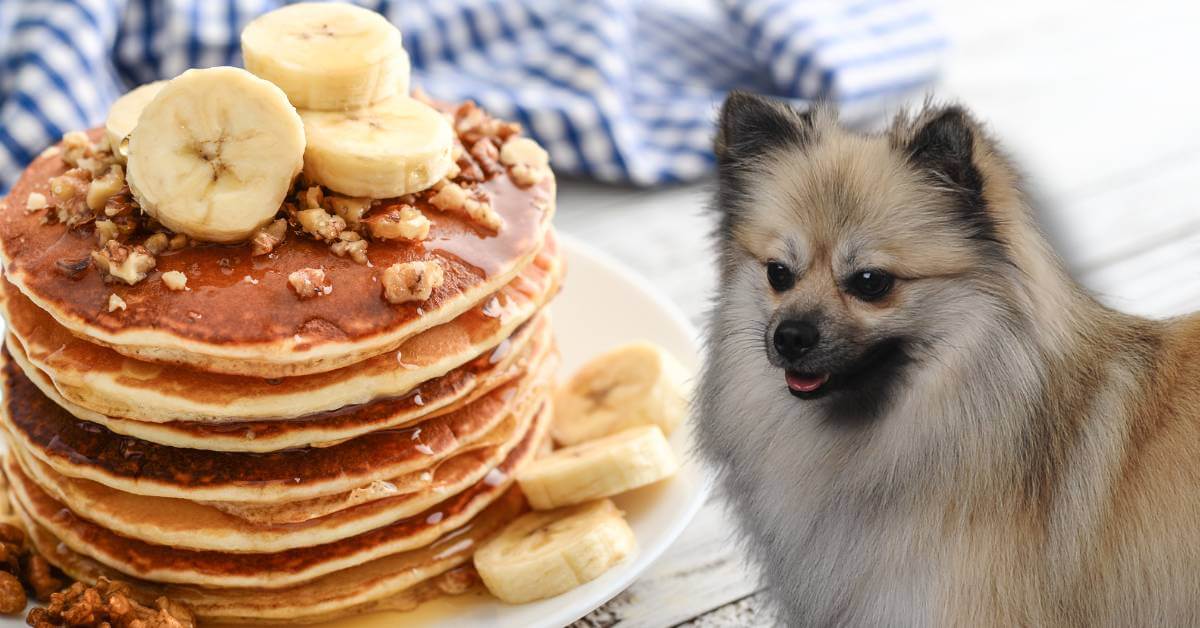Can Dogs Eat Pancakes?
Maybe they can. While pancakes are certainly not dog food, they can grab a bite of plain pancakes (no toppings) if they want. Just make sure to skip the syrup, butter, and other toppings, as those can be bad for dogs. Give them only a small piece as a special treat on special occasions, but don’t let them indulge.
Also, be careful not to include any toxic artificial sweeteners like xylitol. It’s important to remember that pancakes should be a rare treat and not a regular snack, as the combination of sugar and flour isn’t ideal for dogs.

I love making pancakes, and my dog adores them! When I make the batter, I use regular flour, eggs, milk, coconut oil, and a pinch of baking powder to make a special pancake on a non-stick pan. That special pancake is for my dog!
Only then do I add some coconut sugar or erythritol to the remaining batter since my husband likes things sweet, and I make a whole batch for us. My dog, Ricco, adores anything cake-like, as there’s something about the soft sponge that he loves.
If your dog eats your regular pancakes with sugar, they’ll be fine. There’s nothing toxic in plain pancakes; it’s just that you shouldn’t make this a habit. Similar to carrot cake, cheesecake, and other desserts we’ve written about, pancakes are perfectly fine as an occasional treat (or a mishap!), but they shouldn’t be part of your dog’s diet.
When are pancakes bad for dogs?
If dogs get used to eating pancakes, they might start refusing their regular kibble or other dog food, getting spoiled by the taste and texture of human treats. This can lead to a lack of essential nutrients that are vital for their health. However, pancakes are not bad for dogs because of the sugar, fat, and flour alone, but because of the other ingredients we often add.
Pancakes can be particularly dangerous for dogs when they include toxic ingredients like raisins, xylitol, and certain nuts, such as macadamia nuts.
Chocolate is another big no-no for dogs. While caramel isn’t toxic for dogs, it can cause significant stomach issues. Jelly is also a concern since it often contains high amounts of sugar and sometimes artificial sweeteners like xylitol, which is toxic to dogs.
One of our favorite pancake toppings – Nutella, is not toxic to dogs, but it’s still not recommended. A small piece or even a whole Nutella pancake might not cause serious harm, but it could lead to an upset stomach as it’s high in fat.
Can dogs eat pancakes with syrup?
Dogs really shouldn’t eat pancakes with syrup. Pancake syrup is loaded with sugar, which can lead to a host of health problems for dogs. Unlike humans, dogs have a much harder time metabolizing sugar, which can cause rapid spikes in blood sugar levels.
This isn’t just about the extra calories, though those are a concern too. Regular high sugar intake, can lead to obesity, diabetes, and other metabolic issues in dogs.
Additionally, sugary foods can wreak havoc on your dog’s dental health. Dogs are prone to dental issues, and the high sugar content in syrup can accelerate tooth decay and lead to painful dental diseases. But, of course, this doesn’t happen overnight, so please don’t worry.
Making pancakes safe for your dog
I’ve already shared how I make pancakes for Ricco. I make the batter from eggs, milk, flour, coconut oil and a bit of baking powder, then I add sugar and sometimes vanilla extract, only after I make his pancake. That will be your ideal pancake mix your dog.
Once the dog friendly pancakes are ready, you can top them with bananas, a small amount of peanut butter, apples, blueberries, or raspberries. Just remember that treats, including these special pancakes, should make up no more than 10% of your dog’s daily caloric intake to keep them healthy and balanced.
Love, life, and fur forever!
FAQs
Can dogs eat Kodiak pancakes?
Kodiak pancakes are generally okay for dogs in small amounts since they’re made with basic stuff like flour, eggs, and milk. But they usually have added sugar and other things that aren’t great for dogs. It’s better to make a batch without any sugar or artificial sweeteners. Always check the ingredient list to make sure there’s nothing harmful. Even with plain Kodiak pancakes, moderation is key to keeping their tummies happy.
Can dogs eat Krusteaz pancakes?
You can share Krusteaz pancakes with your dog, but be careful. These mixes often have sugar and other additives that dogs shouldn’t have. If you want to share, make a batch without any added sugars or artificial flavors. Always check for harmful ingredients like xylitol or chocolate. A small, plain piece once in a while is fine, but don’t make it a habit.
Can dogs eat blueberry pancakes?
Blueberry pancakes can be a yummy treat for dogs if you make them right. Blueberries are safe and good for dogs, full of antioxidants and vitamins. Just make sure the pancakes don’t have added sugar or artificial sweeteners. Keep the portions small to avoid any tummy troubles.
Can dogs eat protein pancakes?
Protein pancakes can be okay for dogs if you use dog-friendly ingredients. Many protein pancakes have things like whey protein or artificial sweeteners, which aren’t good for dogs. Make a homemade version with simple ingredients like eggs, flour, and a little peanut butter. Avoid using protein powders unless you’re sure they’re safe for dogs. Serve in moderation!
Can dogs eat buckwheat pancakes?
Buckwheat pancakes can be a good option for dogs since buckwheat is gluten-free and easier to digest. When making buckwheat pancakes for your dog, skip any added sugars or harmful ingredients. Buckwheat is nutritious and safe for dogs, providing fiber and essential nutrients. Serve them plain and in small portions to avoid overfeeding.